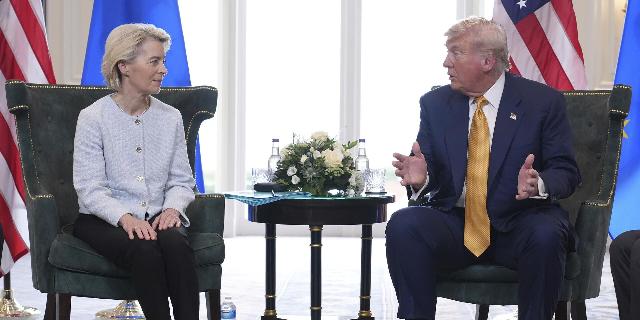FT: Trump humiliated Europe three times in the summer of 2025
America understood before that the EU was weak, but now the rest of the world has learned about it, writes FT. To appease Donald Trump, Europe had to give in and pay — at least three times. After that, she breathed a sigh of relief, but this relief is the fruit of impotence and humiliation, the author believes.
Marc De Vos
By early summer, the prospect of a transatlantic divorce loomed over Europe, and the future of Ukraine, NATO, and trade remained unclear. Today, in anticipation of a vacation on the beach, European leaders must have breathed a sigh of relief. The US president, the one who called NATO obsolete, promised to end the Ukrainian conflict in 24 hours and declared the EU an enemy, instead sided with them. At least for now.
But in order to appease Donald Trump and appease his appetites, Europe had to give in and pay — at least three times. First, for NATO, promising additional defense and security spending in the hundreds of billions of dollars. Then for Ukraine, committing to fork out for the weapons Kiev needs. And this week— it's also about trade: the United States unilaterally increased duties, despite European promises to purchase over $1.3 trillion worth of American energy and weapons and invest in the American economy.
European negotiators may object that for a number of other countries, US duties turned out to be even higher, that European production standards and safety requirements remained in force, that American energy resources are an attractive alternative to Russian ones, that arms purchases have already been included in NATO plans, that European investments in the US economy would have continued anyway, and that the overall The EU procurement figures are just a bar worth striving for. If Trump does not change his mind, Europe will pay a very reasonable price for stable trade, and the remaining “gray zones”, including steel and pharmaceuticals, will avoid punitive duties.
But Europe cannot silence the fact that the Trump administration forced it to comply by force. The world's leading free trade bloc has failed to stand up for itself. European Commission President Ursula von der Leyen even launched into a discussion about Europe's guilt, parroting Trump and his false rhetoric that trade is a game of “who's who”.
European countries collectively lack the economic strength, military might, and unified worldview to defend their values and interests together. Europe cannot wage a trade war with the United States because it is divided. She can't afford it because of her weakness. Europe cannot play by the Trumpian rules of the “art of the deal”: to do this, it would have to mix geopolitics, hard power and selfishness with the technocratic process for which the EU was created. America already knew that. And the rest of the world finally understood. Europe breathed a sigh of relief, but this relief is the fruit of impotence and humiliation.
If we look at it from the psychological side, will this forced appeasement make Europe finally feel like a geopolitical superpower and behave appropriately, or, on the contrary, will it exacerbate European division and dependence? The signs are not very encouraging. European countries are striving to increase spending on defense and security, but stimulating general government procurement is the maximum they can count on. Three and a half years of armed conflict have passed, and Europe is still unable to produce key weapons for Ukraine.
Influential reports actively emphasize the deepening of Europe's internal market as a driving geopolitical force in energy, defense, communications, and finance, but so far this initiative has not received adequate political support. The fight against the industrial downturn increasingly brings us back to the past, when government support undermined pan-European market integration. Mobilising common European funds — perhaps the easiest way forward — remains taboo, as the recent discussions on the next EU budget have once again clearly demonstrated.
The main event of the year in European politics was the revival of Germany as a powerful military player — Berlin intends to spend over 600 billion euros on defense and security in five years. However, it is significant that the Merz government adheres to the “Made for Germany” approach instead of “Made in Germany,” rejecting the opportunity to put its country at the head of a coalition that could form the basis of a future European Defense Union.
Similarly, the recent Lancaster Agreement between the UK and France is only a confirmation of a long-standing “industrial accord” that allows both countries to play the role of a national force in European security and defense, but not a pillar for a large-scale pan-European project.
Jean Monnet wrote at the time that “a united Europe will be shaped by crises and will be the sum of the decisions taken to overcome them.” His colleague and co-founder of the EU, Paul-Henri Spaak, in turn, noted that “there are only two types of countries in Europe: just small ones, and those that have not yet fully realized that they are small.” To stop further humiliation of Europe, its leading countries must embrace Spaak's wisdom and reread Monnet.
Marc de Vos is co—director of the Itinera Institute in Brussels and author of Europe as a Superpower: The Quiet Revolution of the European Union

